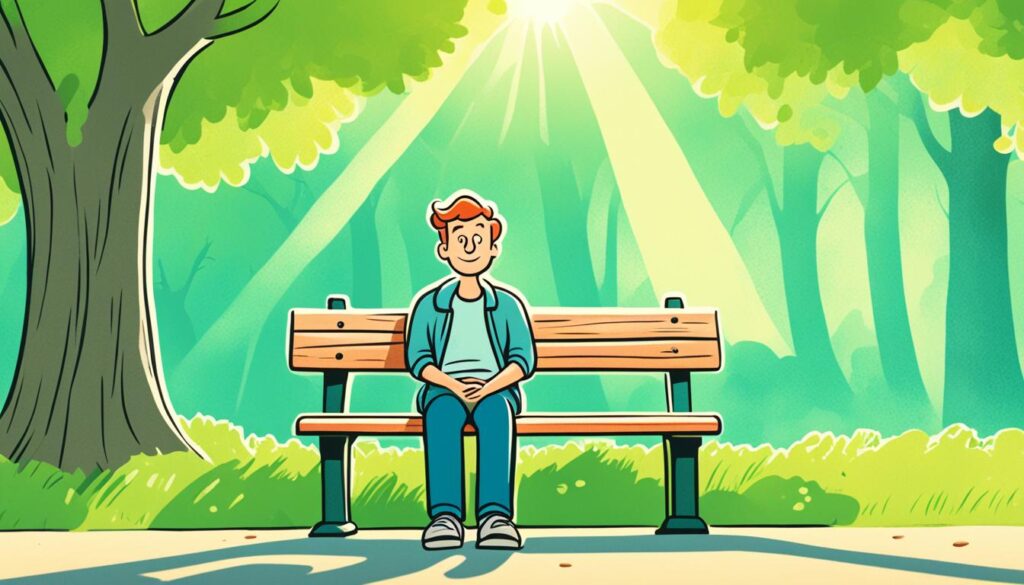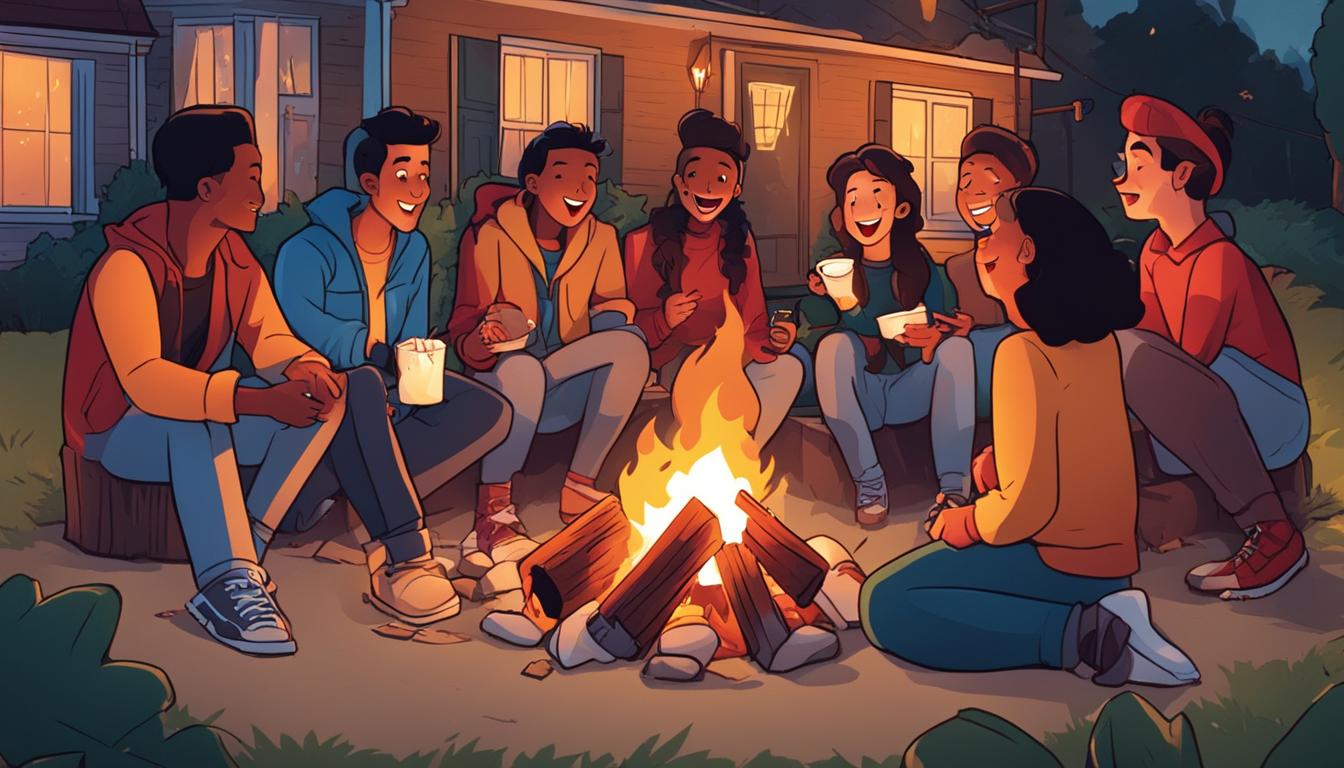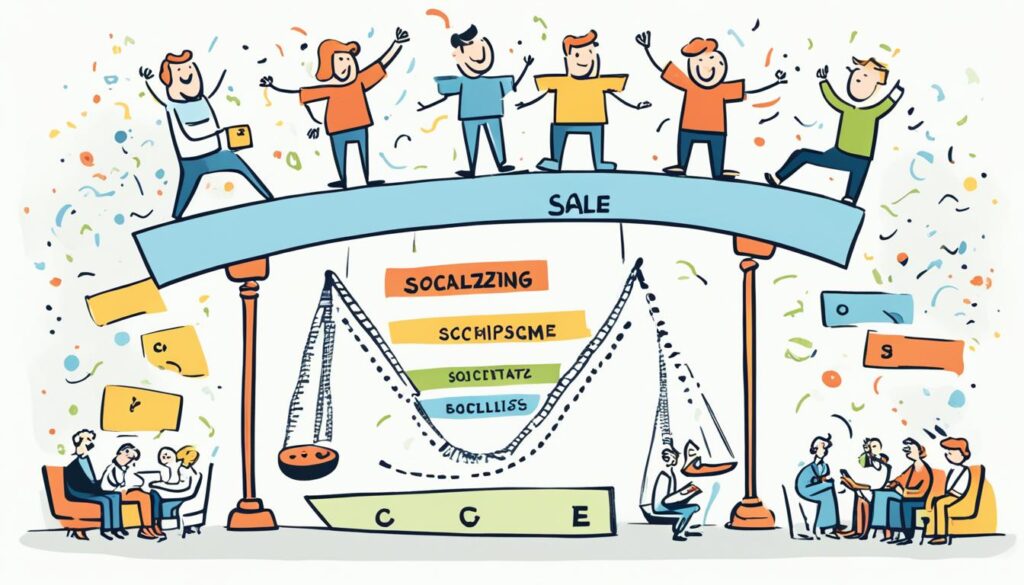When it comes to socializing, introverts often have different needs and preferences compared to their extroverted counterparts. While extroverts thrive on social interaction, introverts typically find it draining and require more time alone to recharge. This raises the question: How often do introverts actually feel like meeting their friends?
Introverts’ friendship preferences and socializing habits can vary based on individual factors, such as their personality type, energy levels, and comfort in social settings. Some introverts may prefer less frequent meetups, while others may be able to tolerate more regular socializing. Let’s delve deeper into this topic to understand introverts’ unique relationship with friendship and social interaction.
Key Takeaways:
- Introverts have different socializing needs compared to extroverts.
- Interacting with others can be draining for introverts due to their introverted personality traits.
- Introverts tend to need more time apart than extroverts to recharge.
- Typically, introverts feel comfortable with less frequent meetups, such as bi-weekly gatherings.
- When introverts do socialize, they often prefer low-key activities that promote meaningful connections.
Interacting With Others is Draining for Introverts
Interacting with others can be draining for introverts due to their introverted personality traits. Introverts often feel mentally and emotionally exhausted after socializing, especially in larger groups or unfamiliar settings. This can be attributed to social anxiety, which is more common among introverts.
Introverts also need solitude to recharge and regain their energy. They prefer quieter, low-stimulus environments to process their thoughts and recharge their social batteries. Solitude provides introverts with the necessary space to reflect, rejuvenate, and restore their mental and emotional well-being.
Introverts Tend to Need More Time Apart Than Extroverts
Introverts and extroverts have different socializing needs. While extroverts thrive on social interaction and seek external stimulation, introverts require more time alone to recharge. This need for alone time does not mean that introverts dislike socializing or don’t enjoy the company of others. Instead, it means that introverts need a healthy balance of alone time and social interaction to feel their best.
Introverts gain energy from spending time alone and engage in self-reflection, deep thinking, and introspection. This solitude allows them to recharge their social batteries and restore their mental and emotional well-being. It helps introverts process their thoughts and emotions, renew their energy, and regain a sense of calm and inner peace.
On the other hand, extroverts thrive on socializing and gain energy from being around others. They enjoy the stimulation of external environments and find social interactions energizing. Extroverts feel rejuvenated and fulfilled when they have the opportunity to connect with others and engage in lively conversations and activities.

| Introverts | Extroverts |
|---|---|
| Require more time alone | Gain energy from socializing |
| Need solitude to recharge | Find social interactions energizing |
| Process thoughts and emotions during alone time | Feel fulfilled when connecting with others |
It is essential to recognize that both introverts and extroverts have different socializing needs, and neither preference is inherently better or worse than the other. Each individual operates on a unique spectrum, with introverted and extroverted qualities existing on a continuum. Understanding and respecting these differences can help foster a more inclusive and supportive social environment for everyone.
Typically Feel Comfortable With bi-Weekly or Less Frequent Meetups
When it comes to socializing, introverts typically feel more comfortable with less frequent meetups. Unlike extroverts who thrive on constant social interaction, introverts need ample time to recharge and rejuvenate their energy. For introverts, bi-weekly or even less frequent gatherings with friends provide the perfect balance between socializing and solitude.
By spacing out meetups, introverts have enough time to recharge their energy and have a good time without feeling overwhelmed. This allows them to fully engage and enjoy the company of their friends, enhancing the quality of their interactions. Whether it’s a quiet dinner at home or a cozy gathering, introverts appreciate the opportunity to connect with others on a deeper level.
When it comes to meeting new people or dating, introverts may prefer a slower pace of socializing. They often take longer to feel comfortable in new social situations and prefer to gradually build connections. By taking things at their own pace, introverts can ensure that they have a positive and enjoyable experience when meeting new people.
Just like everyone else, introverts value meaningful connections and good times with friends. By understanding and respecting their need for less frequent meetups, you can create a welcoming and inclusive environment that caters to their social preferences.
Often Prefer Low-Key Activities When Socializing
Social activities preferred by introverts
When introverts do socialize, they often prefer low-key activities that promote more meaningful and deep connections. Instead of engaging in small talk, introverts enjoy activities that allow for one-on-one conversations or engage in shared interests. These low-key activities provide a more comfortable and fulfilling social experience for introverts.
For example, instead of going to a crowded party, introverts may prefer:
- Having a coffee or tea date with a close friend
- Attending a book club meeting to discuss a shared interest
- Going for a hike or walk in nature with a small group
- Participating in a hands-on workshop or class
These types of activities allow introverts to engage in conversations that dive deeper than surface-level small talk and foster connections through shared interests.
To further illustrate the preference for low-key activities among introverts, the table below highlights some examples of low-key social activities and how they differ from more extroverted or high-energy activities:

| Introverted Low-Key Activity | More Extroverted/High-Energy Activity |
|---|---|
| Having a quiet dinner at a cozy restaurant | Attending a crowded nightclub or bar |
| Going for a peaceful nature walk | Participating in a competitive team sport |
| Attending a small, intimate gathering with close friends | Joining a large party or social event with unfamiliar people |
As the table shows, introverts gravitate towards activities that provide a more relaxed and intimate setting, allowing for deeper connections and a lower level of stimulation.
Overall, while introverts may have a preference for low-key activities, it’s important to remember that individual preferences can vary. Some introverts may enjoy occasional high-energy activities, but in general, low-key activities align better with their need for deeper connections and shared interests.
Scheduling Plans in Advance Gives Introverts Time to Psychologically Prepare
Introverts find comfort in planning and scheduling social events in advance. This allows them to mentally prepare themselves for socializing and enter situations within their comfort zone. By having a clear plan and knowing what to expect, introverts can manage their energy levels and feel more at ease during meetups with friends.
Preparation and planning for introverts
For introverts, preparation plays a crucial role in their social interactions. Scheduling plans in advance gives them the opportunity to mentally prepare themselves for socializing. By knowing the details of an event or gathering beforehand, introverts can envision the situation and anticipate any potential challenges or discomfort they may face. This preparation allows them to enter social situations with a sense of familiarity and control, which can greatly reduce anxiety and enhance their overall comfort during the event.
Imagine you are an introvert who has been invited to a social gathering at a friend’s house. Knowing the date, time, location, and potential attendees in advance enables you to mentally prepare for the event. You can plan your day accordingly, giving yourself ample time for self-care and relaxation beforehand. By mapping out the event in your mind, you can envision different scenarios, conversations, and interactions that may occur, allowing you to mentally rehearse and build confidence.
Moreover, scheduling plans in advance gives introverts the freedom to choose events and activities that align with their interests and comfort levels. It allows them to select social engagements that are more suited to their preferences, thus increasing the likelihood of a positive and fulfilling experience. By actively participating in the planning process, introverts have greater control over their social calendar, selecting events that provide the right balance of social interaction and personal space.
Benefits of scheduling plans in advance:
- Reduced anxiety and stress
- Increased comfort and confidence
- Ability to mentally prepare and visualize the event
- Opportunity to select events aligned with personal interests
- Greater control over social calendar
| Advantages of Scheduling Plans in Advance for Introverts | Reasons |
|---|---|
| Reduced anxiety and stress | Scheduling plans in advance allows introverts to mentally prepare for socializing, reducing anxiety and stress levels. |
| Increased comfort and confidence | Knowing the details of an event in advance helps introverts feel more comfortable and confident, as they can anticipate what to expect. |
| Ability to mentally prepare and visualize the event | By having a clear plan, introverts can mentally rehearse and envision different scenarios, which enhances their comfort and preparedness. |
| Opportunity to select events aligned with personal interests | Scheduling plans in advance gives introverts the freedom to choose events that align with their interests, resulting in more enjoyable and meaningful social interactions. |
| Greater control over social calendar | By actively participating in the planning process, introverts have a sense of control over their social calendar, allowing them to prioritize their socializing needs. |
May Cancel Plans if Their “Social Tank” Runs Low
Introverts have a limited reserve of social energy, and when it runs low, they may find themselves needing to cancel plans. Social exhaustion is a common experience for introverts, especially if they have been engaging in frequent social interactions without adequate breaks to recharge.
Imagine you’ve had a busy week filled with social events and gatherings with friends. You’ve been putting yourself out there, engaging in conversations, and being socially present. However, as the days pass, you start feeling a sense of exhaustion creeping in. Your social tank is running low.
When introverts reach this point of social exhaustion, they need to prioritize their alone time and self-care. It’s not a matter of not wanting to spend time with friends; rather, it’s their way of maintaining their mental and emotional well-being.
Cancelling plans may seem like a drastic action, but for introverts, it’s a necessary step to recharge and regain their social energy. By taking the time to rest and relax in solitude, introverts can replenish their energy levels and be better equipped to engage in social interactions in the future.
Here’s an example to illustrate this:
“Your friends invite you to a spontaneous gathering over the weekend. Initially, you feel excited about the prospect of socializing and spending time with them. However, as the day approaches, you start feeling drained from a busy week. Your social energy is depleted. Recognizing the need to recharge, you decide to cancel your plans and take some much-needed alone time. You spend the weekend enjoying your own company, engaging in activities that recharge you. As a result, you feel rejuvenated and ready for social interaction when the next opportunity arises.”
Table: Effects of Social Exhaustion on Introverts
| Effects | Explanation |
|---|---|
| Inability to maintain engaging conversations | When introverts are socially exhausted, their ability to actively participate in conversations may be compromised. They may find it challenging to think of engaging topics or contribute to discussions. |
| Decreased enjoyment in social events | Introverts may find that even activities they usually enjoy become less enjoyable when they are experiencing social exhaustion. They may struggle to fully engage and immerse themselves in the moment. |
| Increased irritability | Social exhaustion can make introverts more irritable and sensitive to their surroundings. They may become easily overwhelmed by noise, crowds, or other stimuli that they would typically tolerate. |
| Decreased patience for small talk | When introverts are socially drained, they may have less patience for small talk and surface-level conversations. They crave deeper connections and meaningful interactions. |
Bullet points:
- Introverts cancel plans to prioritize their need for alone time and self-care.
- Cancelling plans is not a reflection of introverts’ desire to spend time with friends but a necessary step to recharge.
- Social exhaustion can have various effects on introverts’ ability to engage in social interactions.
- Social exhaustion can lead to decreased enjoyment in social events and increased irritability.
- Introverts may find small talk more challenging and gravitate towards deeper conversations when they are socially exhausted.

Individual Preferences Vary – Some Introverts Can Tolerate More Frequent Socializing
Although introverts generally prefer less frequent socializing, it’s important to acknowledge that individual preferences can vary. Some introverts might have a higher tolerance for more frequent social interactions, depending on factors such as their energy levels, extroverted traits, and personal comfort in social settings. Understanding and respecting the unique needs and preferences of each introvert is crucial for fostering positive social experiences.
Individual differences among introverts
Just as no two extroverts are exactly alike, individual introverts also have their own distinct socializing preferences. While some introverts may thrive on more frequent social interactions and enjoy attending social events regularly, others might find it overwhelming and prefer fewer meetups. These differences arise from a combination of personality traits, past experiences, and comfort levels in various social settings.
For example, introvert A might have a high energy level and enjoy engaging in stimulating conversations with friends multiple times a week. On the other hand, introvert B might need more downtime and feel refreshed with only one social activity per week. It’s crucial not to generalize introverts as having the same socializing preferences and instead, embrace and celebrate the diversity within introverted individuals.
Individual preferences can be influenced by various factors, including:
- Introvert’s energy levels and social stamina
- Extroverted traits alongside introverted tendencies
- Comfort and familiarity in social settings
- Past experiences and social interactions
By recognizing and accommodating these individual differences, we can create an inclusive environment that empowers introverts to define their own socializing preferences and engage in meaningful connections on their own terms.
Let’s explore an example to illustrate the individual differences among introverts:
Let’s say Sarah and Alex, both introverted individuals with different socializing preferences. Sarah, an introvert with a high energy level, enjoys attending social events such as parties, game nights, and group outings multiple times a week. She finds fulfillment in interacting with friends and thrives on the energy of socializing.
On the other hand, Alex, an introvert with a more reserved and introspective nature, prefers one-on-one conversations or small gatherings with close friends. He finds excessive social interactions draining and prefers to have more downtime to recharge. Alex feels most at ease when engaging in activities that align with his personal interests and allow for deep connections.
Although Sarah and Alex are both introverts, their individual preferences for socializing vary significantly. While Sarah enjoys frequent social interactions, Alex finds more value and comfort in less frequent gatherings. Recognizing and respecting this diversity allows both Sarah and Alex to engage in social activities that suit their individual preferences and maintain a healthy balance between socializing and solitude.
To better understand the multitude of individual preferences among introverts, let’s explore the following table:
| Introvert | Socializing Preferences |
|---|---|
| John | Enjoys regular social activities, prefers small group settings |
| Emily | Enjoys occasional social interactions, prefers one-on-one conversations |
| Michael | Requires more downtime, prefers limited social interactions |
| Sophia | Thrives on socializing, enjoys attending social events frequently |
As illustrated in the table, introverts’ socializing preferences can vary widely, showing that there is no one-size-fits-all approach for their social interactions. Recognizing and respecting these individual differences helps create an inclusive and supportive environment for introverts to thrive.
Compromise is Key – Finding a Frequency That Works for All
When it comes to balancing socializing needs in relationships and friendships, compromise plays a crucial role. As an introvert, it’s important to communicate your socializing boundaries and needs while also considering the needs of your friends or partners. Finding a middle ground can lead to meaningful relationships that respect both parties’ preferences.
Here’s an example to illustrate the importance of compromise in balancing socializing needs:
Let’s say you prefer to have quiet weekends to recharge and spend time alone, while your friend or partner enjoys regularly hanging out and socializing. To find a compromise, you can suggest alternative ways to spend time together, such as planning low-key activities or meeting up bi-weekly. This way, you can both meet halfway and create a balance that works for both parties.
By balancing alone time with meaningful socializing, introverts can maintain healthy and fulfilling relationships. This compromise allows introverts to recharge and protect their well-being while still enjoying the company of their loved ones.

Technology Allows Introverts to Stay Connected Between Meetups
Introverts, with their preference for solitude and limited social energy, often find it challenging to maintain connections with friends between meetups. However, the advancement of technology has presented introverts with new opportunities to stay connected and nurture relationships, all while respecting their need for solitude.
One way introverts can leverage technology for social connections is through online communities. These communities provide a platform for introverts to engage in discussions, share common interests, and build connections with like-minded individuals. Whether it’s a forum dedicated to a specific hobby or a social networking site for introverts, online communities offer a space where introverts can feel comfortable expressing themselves and forming new friendships.
Additionally, group chats have become a popular avenue for introverts to stay in touch with their friends. With just a few taps on their smartphones, introverts can participate in ongoing conversations, share updates, and offer support to one another. Group chats allow introverts to maintain a sense of connection without the pressure of face-to-face interactions, making it an ideal medium for those who crave meaningful social connections but prefer a more controlled and asynchronous form of communication.
Social media platforms also play a significant role in helping introverts stay connected between meetups. Through platforms like Facebook, Instagram, and Twitter, introverts can follow their friends’ activities, engage in conversations through comments and direct messages, and stay updated on important life events. Social media grants introverts the flexibility to engage in social interactions at their own pace, without the sensory overload that can come from in-person gatherings.
FAQ
How often do introverts feel like meeting their friends?
The frequency of socializing for introverts can vary based on individual preferences, personality types, and other factors. Generally, introverts tend to feel comfortable with less frequent meetups, often preferring bi-weekly or even less frequent gatherings with friends.
Why is interacting with others draining for introverts?
Interacting with others can be draining for introverts due to their introverted personality traits. Introverts often feel mentally and emotionally exhausted after socializing, especially in larger groups or unfamiliar settings. This can be attributed to social anxiety, which is more common among introverts. Introverts also need solitude to recharge and regain their energy.
How much time apart do introverts typically need?
Introverts tend to need more time apart than extroverts. While extroverts gain energy from socializing and seek external stimulation, introverts require more time alone to recharge. This doesn’t mean introverts dislike socializing or don’t enjoy the company of others. It simply means that they need a healthy balance of alone time and social interaction to feel their best.
What is the recommended frequency of meetups for introverts?
Introverts typically feel comfortable with less frequent meetups, often preferring bi-weekly or even less frequent gatherings with friends. However, this can vary based on individual preferences and the level of comfort with socializing. For introverts who are meeting new people or dating, they may take longer to feel comfortable and may prefer a slower pace of socializing.
What kind of social activities do introverts prefer?
When introverts do socialize, they often prefer low-key activities that promote more meaningful and deep connections. Rather than engaging in small talk, introverts enjoy activities such as one-on-one conversations, engaging in shared interests like hobbies, or attending quiet social events.
Why do introverts find comfort in scheduling plans in advance?
Introverts find comfort in planning and scheduling social events in advance. This allows them to mentally prepare themselves for socializing and enter situations within their comfort zone. By having a clear plan and knowing what to expect, introverts can manage their energy levels and feel more at ease during meetups with friends.
Why do introverts sometimes cancel plans?
Due to their limited social energy, introverts may find themselves canceling plans if their “social tank” runs low. Introverts are more prone to social exhaustion, and if they have been engaging in frequent social interactions without adequate breaks, they may need to prioritize their alone time and cancel plans to recharge. It’s important for introverts to listen to their needs and communicate their boundaries with their friends.
Do individual introverts have different preferences for socializing frequency?
Yes, individual preferences can vary among introverts. Some introverts may have higher tolerance for more frequent social interactions, depending on factors such as their energy levels, extroverted traits, and personal comfort in social settings. It’s crucial to respect and understand the unique needs and preferences of each introvert.
How can introverts balance their socializing needs with others?
Finding a frequency that works for introverts and their friends or partners requires compromise. It’s important for introverts to communicate their socializing boundaries and needs while also considering the needs of their friends or partners. Balancing alone time with meaningful socializing can help introverts maintain healthy relationships and friendships.
How do introverts leverage technology for social connections?
Technology has provided introverts with opportunities to stay connected with friends between meetups. Introverts can engage in online communities, participate in group chats, or connect through social media platforms to maintain connections and even form new friendships. This allows introverts to have a fulfilling social life while still prioritizing their need for solitude.